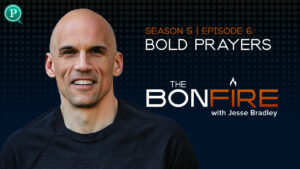Summer is busy, so I’m launching these Summer Session episodes to help get you useful encouragement while you enjoy the new rhythms summer has to offer.
Today we discuss how what we listen to can help us focus on the things of the Spirit. I’ll address three great podcasts, an audio book I’ve found incredibly helpful when it comes to focusing on the Spirit, and a reflection to make this week an intentional practice in living out Romans 8:5-8.
5 Those who live according to the flesh have their minds set on what the flesh desires; but those who live in accordance with the Spirit have their minds set on what the Spirit desires. 6 The mind governed by the flesh is death, but the mind governed by the Spirit is life and peace. 7 The mind governed by the flesh is hostile to God; it does not submit to God’s law, nor can it do so. 8 Those who are in the realm of the flesh cannot please God.
Show Notes:
Podcast Recommendations:
- Axis Cultural Translator
- Fierce Marriage Podcast
- The Life Lessons with Dr. Steve Schell
- Book by John Mark Comer: The Ruthless Elimination of Hurry
“Our tech world encourages us to live a style of life that outpaces our soul.” John Mark Comer
Ways to listen:
🔗 click the link in the profile
🎧 search Gospel Tech in your favorite streaming service (iTunes, Amazon)
Transcription:
Nathan [00:00:08] Heavenly Father, thank you for this opportunity to talk about technology. And today talking about how what we ingest helps us set our minds on either You or not You. I pray God for wisdom in this and that You would open our eyes to see and our ears to hear what You are saying to us that we might follow You more and follow You better and and love You more. In Your name, amen.
Nathan [00:00:29] Hello, everyone, and welcome to the Gospel Tech podcast. My name is Nathan Sutherland, and this podcast is dedicated to helping families love God and use tech. Today is our summer listening episode. And this is kicking off what I’m going to try to do as like a Gospel tech ten These short summer episodes, what I’ve seen over the last couple of years is that people are busy in the summer. Your kids are around a lot. You don’t always have commutes and time alone to listen to podcast. So instead of dragging you out for 40 minute long slugfests of thought and thinking in your summer months, I’m going to try to make these concise and intentional and helpful for you. And who knows, maybe we’ll roll that into the fall if it’s super helpful for you. So today we’re talking about summer listening, and I do want to get actually I’ll address this afterwards. So that’s kind of our focus for today. That’s where we’re headed with these kind of through the next two months of summer. So July, August, basically. And there’ll be some interviews kind of peppered throughout. And I’m excited for just these topics and these specific shorter formats to be helpful in these busy months. So with no further ado, let’s get this conversation started.
Nathan [00:01:37] Welcome to the Gospel Tech podcast, a resource for parents who feel overwhelmed and outpaced as they raise healthy youth in a tech world. As an educator, parent and tech user, I want to equip parents with the tools, resources and confidence they need to raise kids who love. God and use tech. Thank you to everyone who has helped make this podcast possible. Thank you for listening, for liking, for sharing. Thank you for subscribing so you don’t miss any new content and thank you for supporting us. Those of you who’ve gone to GospelTech.net or Gospel Tech Workshop.com, you’ve either got the Gospel Tech, the family tech framework, or you’re just supporting us with donations. We’re a 501c3 nonprofit and that is so encouraging and helpful. Thank you for making this work, work. I do want to get the elephant out of the room, which is for those of you who are seeing this on YouTube. There’s this little situation happening on my face. There’s what could be the beginning of a mustache depending on who you are. I’m very much like that old. Will Ferrell, George W Bush episode of SNL, where he’s like, “I don’t grow a beard because it comes in kind of patchy.” That’s how this goes. But my son Henry really wanted me to try one. So my last official talk of the season was last week. And so now that I’m in before the fundraiser. In August, there may be some situation, so don’t get distracted too much. I apologize if it gets worse.
Nathan [00:03:06] But today we’re talking about summer listening, specifically this idea of what are we putting into our minds? How can we use our free months and our free listening of summer to support our goal of loving God in this tech world and therefore helping us raise up kids who love God and use tech? So we’re going to start this with some suggestions that are kind of a biblical reminder and then an application. So first. This idea of what are we listening to? I want to start with a couple of podcast, so some that I find encouraging you know, I’m someone with limited mental bandwidth and by that I mean I cannot constantly be listening to something. I have friends who are just serial ingestures of information and they’re amazing at it. God has gifted their brains to ingest massive quantities of information. They listen on the double X speed and they just can listen and remember and retain and then apply. And that’s awesome. I’m not that person. So here’s some that I enjoy. Add it to your copious stack of listening or maybe make one of these your first listen. I really enjoy Axis, the culture translator. A-X-I-S if you search that wherever podcast you listen to or if you look up culture translator. Axis is like an eight minute audio reading of an email they send out every week, which I find useful because I don’t always have 8 minutes to read and I always have 8 minutes in the car. They’ll address a couple kind of tech top cultural pieces, usually involving tech or social media or something to do with movies and shows or music, and they’ll give you a couple of talking points in their christian outlet for that. They’re very intentional, they’re biblically based, and I really am encouraged by what they speak on. And they draw that line nicely from trying to keep you apprized of what is culturally relevant and happening this week. So if you have young children from the mid elementary through middle school and high school, topics that might be relevant, you could ask them or their friends about without being gossip driven and kind of giving you the most salacious details that are currently going around. They stay very practical and hey, here’s what’s happened, here’s what’s trending, here’s a hashtag, here’s what happened in the news. Here’s what people are talking about on Twitter without driving you to Twitter. Instead they’ll say, here’s what happened, here’s the general context you did and here’s a couple talking points. If you’re curious, don’t just go spend a half hour online Googling it yourself. Go ask someone who might know. Ask your kid if they’ve heard of this. Ask their friends if they know what’s happening and learn from their perspective. Because the goal isn’t just to keep you informed so you can constantly be, you know, surveying and secret policing your kids. Instead, it’s, hey, know what your kid might be caring about and ask them. Do they know about this? Is this something that they care about? Do they agree with this perspective or how do they interpret what happened? Because those are the relational points that matter for you. And it’s something that I use to begin helping me ask questions of young people. Because otherwise my reference points are seven years ago when I taught middle school, I guess four years ago I taught middle school. But a generation ago, when it comes to middle school, those kids aren’t in middle school anymore. In fact, my last group of eighth graders just graduated. And so I am that far behind. Axis really helps with that.
Nathan [00:06:04] Second one that I enjoy personally for my marriage is Fierce Marriage. There’s a lot of great marriage podcasts and I’ll cover some in the coming weeks and some individual personal development podcast, but I like Fierce Marriage or even their parenting side, Fierce Parenting because I find them very relatable. You may or may not. Check it out. I find them relatable, I find them encouraging. They do not try to pretend like they have it all together. They kind of wear their hearts on their sleeve. They love Jesus, and they come out with what they have walked through with their own personal marriage, their own parenting experience. They don’t, in my opinion, come out with like, “We have it all together and you should too.” They come out saying, “Hey, like we’re busted people and we mess up all the time and here’s what we’re learning through that.” And that has been encouraging. So they’re not perfect. But I really enjoy them. And have found that an encouraging podcast over the last…Man. I think they’ve been doing it like a decade now.
Nathan [00:07:00] And then the third would be Life Lessons with Dr. Steve Schell. Now, I want to give a preface with this, because the introduction to me is physically painful. So if you’ve already listened to this and you love it, that’s great. But there’s this like jingle that comes at the beginning, and it’s a carryover from a radio show he did. And I don’t love it. But if you can just skip past the first 30 seconds and get to Steve Schell. Someone who has been one of the probably the most three influential preaching voices in my life in the last decade, maybe a decade and a half. And it’s been massive for me. So listen to Dr. Steve Schell, his…Oh, my goodness, I’m going to forget the title of it. He was going through Exodus recently. He just exegetical preaches through books of the Bible and these are like little snippets of his sermons that they’ve posted as podcasts now and it’s incredible. It’s encouraging. I would put him right up there with Tim Keller as someone who’s been, who will be a future one so spoiler alert. But someone who is so encouraging in my life and my ability to read scripture well, and he’ll interpret it, you know, straight from the Greek or Latin, but or Hebrew for that matter. But I guess Greek, Hebrew and then go anyway, you get what I’m saying. The Vulgate will be referenced. I found an encouraging and approachable and someone who loves Jesus and is not dynamic. And by that I mean he is not there because he likes speaking to people. I might fall at some point and to just speaking because I have words that is not Steve Schell’s thing. He is an introvert by nature. He speaks because God calls him to and God has given him a heart to see people study their Bibles well, and he wants to help people do that. So he says just the words that’ll help you do it. And I really am encouraged by that. So that’s the life lessons. Or you can look up. Steve Schell It’s S-C-H-E-L-L is how you spell his last name.
Nathan [00:08:48] So those are three podcasts. And I’m going to add to that one book, The Ruthless Elimination of Hurry by John Mark Comer I’ve mentioned it before, but I might just make this the next couple of weeks and give you a quote each week. But the quote I like this week is that our tech world encourages us to live a style of life that outpaces our soul. I love that point. And as we talk about what are we listening to this summer? What are we setting our minds on? That idea of like, are we just engaging more just because it keeps us busy? Because it makes our minds wander and it doesn’t force us to be quiet and to abide and to end up with some individual solitude with God. Not isolation. But solitude, the ability to meditate, to celebrate God’s Word and God’s goodness, and reflect on what God’s calling us to do and repent and like make space for that this summer. So it’s not all trips and shows and craziness with kids. I just being intentional with our tech and with our souls this summer is an awesome opportunity as we change schedules. So Ruthless Elimination of Hurry. If you can’t read it because you fall asleep in 2 minutes, get the audiobook. It would be worth paying whatever the $15 membership for Audible. You can pay the membership and then cancel it after you download your first book and then there’s no monthly fee and you keep the book. The app still works. The books you have still function. So that’s what I’m doing right now. I’ve purchased my books. And I have multiple to work through because they had subscription or I didn’t use credits. And now I’m just hanging on and actually I’ve teamed up with a family member and so we share a combined Audible account and I am currently just the leech on that account, which is amazing and such a blessing. And that individual also purchases great books. So, Ruthless Elimination of Hurry can be done on an audio book and it’s still encouraging and you can just ingested over the course of weeks don’t rush through a book about not rushing.
Nathan [00:10:42] Then let’s go biblical connection the verse that I’m kind of using as. My encouragement reminder on this is Romans 8:5-8. And it says this, “for those who live according to the flesh, set their minds on the things of the flesh. But those who live according to the Spirit set their minds on the things of the Spirit. For the mind set on the flesh is death. But to set the mind on the spirit is life and peace. For the mind that is set on the flesh is hostile to God. For it does not submit to God’s light. Indeed it cannot. Those who are in the flesh cannot please God.” And what I love about that is talking about this choice we have that faith isn’t just something that happens to us. It’s a verb. It’s a belief and a choice. Just like doubt is repeatedly throughout the New Testament that they chose not to believe or they doubted. And it wasn’t that they didn’t have enough information. They saw the sign, they saw the miracle. They heard Jesus speak. They have all the information they need, but they doubted. They chose to not believe. And that idea is important. And I’m not getting into the the deeper weeds on sovereignty and choice in that. What I will say is that if you have a choice, God is moving in that and that what we can do is set our minds on the things of the spirit. We have yet to find an example in the Bible of someone who says, “Lord help me with my unbelief.” And God says, “No.” It’s not there. In fact, we’re told that He gives wisdom to all without finding fault. We can set our minds on the things of the spirit and what we listen to. So in the music, certainly. In the shows you watch, absolutely. But in this case, what podcasts and what intentional ingestion and people who meditate and disciple well, are we ingesting? And then with books, how are we reading or listening to things that will edify us to help us set our minds on the things of the spirit, not on the things of the flesh? Because we naturally go to our flesh and this would be an unnatural practice.
Nathan [00:12:32] And finally, our application each day for this next week. Each day I want you to ask yourself, how will I today set my mind on the things of the Spirit? Maybe you already do a devotional time. That’s awesome, but maybe you need to start one? It doesn’t have to be fancy. I do 5 minutes of Psalms before I do anything, and then I’ll do another quiet time, assuming I’ve got the time. But starting with Psalms for me has been a practice and a repetition. I can return to. That I don’t have to think about. That I know is going to refocus my heart and mind on biblical truths and on the character nature of God. In fact, I was inspired by a different book that I mentioned in the future to read five Psalms a day. It turns out it doesn’t take long. You can do it in 5 to 10 minutes, but if you do them every 30. So if you’ve read Psalm one and 31, and then 61 and 91 and 121, and then it goes all the way up until you read 30 through 150 and you can reset it each month. If you happen to miss one. Okay, you pick those up next month, but you have a habit and you don’t have to think about it and you’ll have to find an extra sheet that tells you what scriptures to read. It’s a great starting point. You can do it quick and it inspires a hunger for scripture that I have found causes me to read more, causes me to want to get a couple of minutes extra. And so that’s a way to do it. But maybe you’ve already got that. Maybe it’s a memory verse, maybe it’s reading Scripture out loud. Maybe it’s reading the Bible with your family, maybe it’s family worship. But something to do this week to set your mind on the things of the spirit. Meaning what’s true about God, what He says about Himself, what His plan for redemption, restoration is in Christ, and what He’s calling you to do, to have or to be. Those are the things we want to meditate on, to ingest and chew on slowly. Not just read chapters, to check a box, to run about our lives, but to let it bother us. To let us bring it up in conversation, to have it be something that comes up often. So I would encourage you this week, each day ask yourself, how am I going to set my mind on the things of Christ?
Nathan [00:14:28] I hope this is encouraging. I hope you enjoyed the shorter format because that’s what we’re doing this summer, and I hope that this week you can be intentional in thinking about the things of Christ and setting your mind on the things of the Spirit, repenting and turning away from the things of the flesh. That you encourage your family, your friends to do so as well, and that you’ll join us next week as we continue this conversation about how we can love God and use tech.







